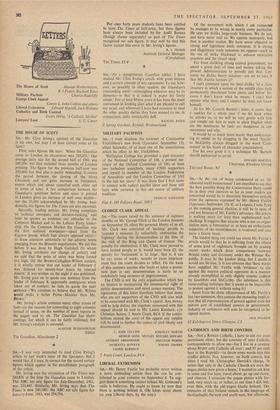The House of. Scott Alastair Hetherington,
R. 1 Fraser, Rachac'! Bates
Military Pacifists Charles Radcliffe George Clark Appeal
Canon L. John Collins and others
Liberal Extremism Edward Martell, Jack Holmes Catholics and Birth Control
Ewart Milne, 'A Catholic Mother'
Lawyers' Loot S. G. Carter
THE HOUSE OF SCOTT SIR,—Mr. Clive Irving's opinion of the Guardian is his own, but may 1 at least correct some of his facts?
First, sales figures. He says: 'When the Guardian
came to London its circulation was 245,451.' Our average daily sale for the second half of 1961 was 245,056; but that included three months of London printing. The figure for the previous half-year was 235,000, but that also is partly misleading; it covers the period between the closing of the News Chronicle and our price increase to fourpence, events which just about cancelled each other out in terms of sales. A fair comparison between the Guardian's positions before and since it printed in London gives an increase of well over 40,000— not the 20,000 acknowledged by Mr. Irving. Inci- dentally, his figures for The Times are also incorrect.
Secondly, leading articles. Mr. Irving complains of 'political ambiguity and decision-funking,' and later he quotes as evidence our attitudes to the Common Market and to the Labour Party Wader- ship. On the Common Market the Guardian was the first national newspaper—apart from the Express group, which had always opposed entry— to draw attention editorially to the adverse terms emerging from the Brussels negotiations. We did this before it was done by Hugh Gaitskell (to whom Mr. Irving attributes our change of policy), and we said that the price of entry was being forced too high. On the Brown-Callaghan-Wilson contest, it is wholly untrue that our leader of February 1 was 'delayed for twenty-four hours by internal dissent.' It was written on the night it was published. Mr. Irving goes on to quote one sentence from the leader of February 8, apparently ambiguous when taken out of context; he fails to quote the next sentence—'We continue to believe that Mr. Wilson would make a better Prime •Minister than Mr. Brown'
Mr. Irving's article contains many other errors of fact—on the reasons for converting to eight columns instead of seven, on the number of news reports in the paper, and so on. The Guardian has short- comings, for which it can be fairly criticised, but Mr. Irving's analysis is unsound.
ALASTAIR HETHERINGTON Editor The Guardian, Manchester 2
*


































 Previous page
Previous page